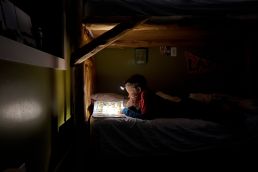I looked at porn for the first time as a seven-year-old boy. While playing at a friend’s house, we went into his attic and found his dad’s stash of porn. I didn’t really know what I was looking at but I took a centerfold home with me and hid it in a drawer in my bedroom. A few years later I found a hard-core porn magazine while biking around our neighborhood. Not long after that I watched my first porn movie and became completely hooked.
My struggle with lust and porn shaped the first few decades of my life. It influenced my views of women, sex, and relationships well into my 20s. As a father of four boys, I desperately want them to grow up with a much more holy view of women, sex, and marriage. To that end, my wife and I prioritized conversations with our children about pornography.
In this post I share how we approached this topic with our boys and what we’re doing about it now that our kids are 16, 16, 13, and 12.
Start earlier than you think you should
We started conversations while our kids were still in pre-Kindergarten. We told them we don’t look at other people’s private areas and we don’t show ours to others. The only ones who see our private areas are doctors and parents (as needed).
We also told them early on that if anyone showed them their private parts or if they saw pictures/movies of someone else’s private parts that they weren’t in trouble. We wanted to keep the doors open for any conversation and told them to tell us if they ever saw something inappropriate or someone asked to see their private parts.
We want them to understand the why against pornography
Porn is an evil industry. People become addicted to porn like they do drugs. I know it’s appealing and many of their friends watch porn, but I want them to hate it.
- We want them to flee from sexual immorality (1 Corinthians 6:18).
- We want there to not be a hint of sexual immorality among them (Ephesians 5:3).
- We want them to understand that when we look at a woman (or man) with lustful intent, it’s like committing adultery (Matthew 5:27-28).
- We want them to make a covenant with their eyes to not look lustfully upon a woman (Job 31:1).
We want them to understand that avoiding pornography is all about saying “no” to something worthless so we can say “yes” to something of surpassing worth— purity and holiness that lead to infinite joy in Christ. They’re not “missing out” by pursuing holiness— not at all.
We want to be the ones to have the talk(s), not someone else
We don’t want school, media/social media, or their friends to be the ones who educate our kids about sex and pornography. Therefore we established from a young age that we wanted our kids to learn about these important topics from us, their parents. We want our kids to hear the biblical view of sexuality and not a secular, worldly view.
It’s a conversation, not a talk
We’ve all heard the phrase, “Have the sex talk.” In our house, we established early on that this would be an ongoing series of conversations and not one, big “talk.” We’ve had conversations in big moments like a weekend away and in little, daily moments (usually in response to something inappropriate heard or seen on TV).
Conversations are a combination of spontaneous, on-the-fly encouragements and intentional, planned discussions. We always allow opportunity for discussion. And we check in on them on a regular basis. We don’t talk about it all the time, but we also don’t ignore it since we addressed it once.
We don’t talk about it all the time, but we also don’t ignore it since we addressed it once.
We never pretend that we are without sin
I’ve been very open with my boys about my struggles with pornography in my teens and 20s, and lust to this day. They know that I sinned sexually as a single man and that Kristen had struggles as well.
We don’t hide our sins and our struggles, but choose to be transparent about them.
We’ve found this gives them hope for the future and helps lessen the shame they may feel. At the same time, we call them to be holy as God is holy, just like we do for ourselves (1 Peter 1:16). We want to be set apart spiritually (sanctified) and desire the same for them.
We discuss risks that come with phones
We know the power and access our kids have with their phones. To this end, we restrict what they have access to. We limit their access to downloading apps and we don’t let them have a browser. We’re strict with social media and don’t want to give them access to all the internet has to offer.
That being said, we also know our kids will soon leave home for college or for work. When they leave, they’ll have access to whatever they want. For this reason, we’re giving them more privileges and access but monitoring their usage and activity along the way.
We remember this is not just a guy’s issue
For too long the Church has made the mistake of assuming pornography and lust is just a guy’s issue. While we don’t have any daughters, I know many of you reading this do. Please don’t make the assumption that this is just a guy’s issue or struggle. Nothing I’ve mentioned above is restricted to just males.
We never want this to feel like a list of tasks or “to-do” items. We want our kids to know that it is for freedom that Christ has set us free (Galatians 5:1). We want them to live abundant lives while walking closely with the Lord. And, when they fall short we want them to know that there is no condemnation for those who are in Christ Jesus (Romans 8:1).
While I wish these were conversations we didn’t need to have, we know it’s a privilege and responsibility to train up a child in the way they should go (Proverbs 22:6).
share this
FREE RESOURCE

Get the Family Vision eBook
Build unity and gain Gospel-centered clarity for life's big and small decisions. Download our 54 page eBook, Crafting Your Own Family Vision Statement by filling out the form below.
We’ll never sell your info. Unsubscribe any time.
about the author
Scott Kedersha
Scott Kedersha serves as the Marriage Pastor at Harris Creek Church in Waco, Texas. He writes about marriage, family, leadership, and ministry, and is the author of Ready or Knot? 12 Conversations Every Couple Needs to Have before Marriage. He is married to Kristen, and has four boys.





